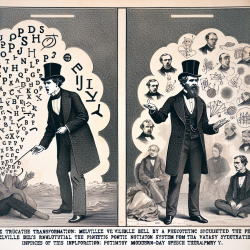Introduction
In the realm of speech-language pathology, particularly within school settings, ensuring consistent participation and compliance with therapy programs is crucial for achieving optimal outcomes. A recent study titled "Improving Fecal Occult Blood Testing Compliance Using a Mailed Educational Reminder" offers valuable insights that can be adapted to enhance compliance in therapy settings. This blog explores how educational reminders can be a powerful tool in improving therapy participation and outcomes for children.
Understanding the Research
The study conducted by Lee et al. (2009) demonstrated that a simple mailed educational reminder significantly increased compliance with fecal occult blood testing (FOBT) for colorectal cancer screening. In a randomized controlled trial, patients who received a mailed reminder were more likely to return their FOBT cards compared to those who did not receive a reminder. The intervention group showed a compliance rate of 64.6% versus 48.4% in the control group, highlighting the effectiveness of educational reminders in enhancing compliance.
Application to Speech-Language Pathology
While the study focused on medical compliance, the underlying principle of using educational reminders can be effectively applied to speech-language therapy. Here are some ways practitioners can implement these findings:
- Customized Reminders: Develop personalized reminders for students and their families about upcoming therapy sessions, highlighting the importance of consistent attendance and participation.
- Educational Content: Include educational materials in the reminders that explain the benefits of therapy and what each session aims to achieve, tailored to the child's specific goals.
- Engagement Strategies: Incorporate quotes or testimonials from other students or parents who have seen positive outcomes from therapy, similar to the veteran quote used in the study.
- Multiple Channels: Utilize various communication methods such as emails, text messages, or physical mail to ensure the reminders reach the intended recipients effectively.
Encouraging Further Research
While the study provides a strong foundation, further research is needed to explore the impact of educational reminders in diverse educational settings. Practitioners are encouraged to investigate the following:
- The effectiveness of digital versus traditional reminders in different age groups.
- The role of parental involvement in enhancing therapy compliance through reminders.
- Long-term effects of consistent educational reminders on therapy outcomes.
Conclusion
Educational reminders have proven to be a cost-effective and efficient method to enhance compliance in various settings. By adapting these strategies to speech-language pathology, practitioners can improve therapy participation and outcomes for children. This approach not only supports the therapeutic process but also empowers families to be active participants in their child's developmental journey.
To read the original research paper, please follow this link: Improving Fecal Occult Blood Testing Compliance Using a Mailed Educational Reminder.










